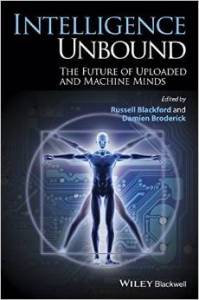Despite the fact that most scientific skeptics do not find themselves formerly associated with a religion, this time of year tends to nonetheless bring out the giving spirit in many of us. Although Tom Flynn wouldn’t approve, many of us celebrate (in a secular fashion) Christmas, or Kwanza, or Festivus, or the Solstice, or Hanukkah, or just like to give presents because it’s fun. With that in mind, I’ve linked below some potential gifts that many a person reading this might want to either give or receive. Each is (in part or whole) the work of one of the Skeptic Ink Network’s fine writers, so you’re not just giving a great gift, you’re helping out a great person.
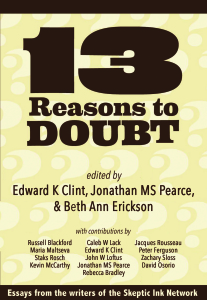 First up is 13 Reasons to Doubt
First up is 13 Reasons to Doubt, the first book from the Skeptic Ink Network. It contains 13 chapters by various SIN bloggers (including myself) and has received quite positive reviews in the press. As I said when it was released:
…this is a very solid book. The topics are very wide ranging (as befits the diversity of the authors) and covers topics outside of the “typical” skeptical ones (e.g., what some people deride as “Bigfoot skepticism”). Instead, you have philosophers, archaeologists, psychologists, anthropologists and more discussing topics from why skepticism is important to cognitive biases to science denialism and more. My personal favorite chapters are those by Russell Blackford and Jacques Rousseau, who both happen to be philosophers and skeptics.
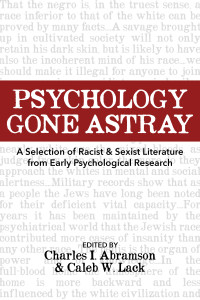 Next (because, after all, I’m the one doing this) is my latest book – Psychology Gone Astray: A Selection of Racist & Sexist Literature from Early Psychological Research
Next (because, after all, I’m the one doing this) is my latest book – Psychology Gone Astray: A Selection of Racist & Sexist Literature from Early Psychological Research. As I said in an interview about the book’s release:
The book addresses an often-ignored issue in psychology: how the results of numerous poorly conducted psychological studies were used to support and justify both scientific and institutionalized sexism and racism….If we do not learn how to spot such dubious research and results, we will likely fall prey to such problems again and again.
I also talked about what we uncovered in our examination of early psychological research in a podcast with the Blue Ball Skeptics, or you can read a sample in this previous post. If you’d like to get any of my others books (with me as solo author or contributing a chapter), just head over to my Amazon author page.
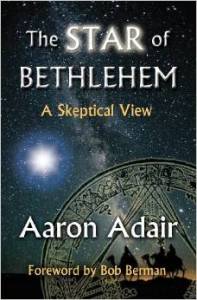 Next up is The Star of Bethlehem: A Skeptical View
Next up is The Star of Bethlehem: A Skeptical View by Aaron Adair (who often writes for the A Tippling Philosopher blog on SIN). As I said when I reviewed it:
Adair writes in clear, concise prose, which is very helpful when you are reading about a scientific field that you have little to no training in. My formal experience with astronomy is minimal, although I do own a telescope and host the occasional star-gazing party…. Nonetheless, despite my ignorance of the field, I never felt lost or confused when reading SOB.
Adair is a clean writer, without the superfluousness that sometimes plagues writers early in their career. In terms of content, Adair does a great job at covering all bases. The book is broadly divided into three sections (The Story, The Hypotheses, and Fatal Problems), with the majority of the book examining the specific natural hypotheses that have been proposed over the centuries to explain the story of the Star as told in the Gospel of Matthew (and only that particular gospel, something many people don’t know).
I n addition, also in the spirit of the season, Jonathan Pearce (mastermind behind ATP) has a book entitled The Nativity: A Critical Examination
n addition, also in the spirit of the season, Jonathan Pearce (mastermind behind ATP) has a book entitled The Nativity: A Critical Examination that does a very thorough job collating the various scholarship on aspects of the Nativity story that we are familiar with (and yet, which doesn’t actually appear in any of the gospels). From the back of the book:
The nativity of Jesus is an event that carries much cultural recognition. However, is it a narrative which commands much support in the academic world? Is it a story which holds much historical truth? Or were the two biblical accounts of the birth of Jesus an opportunity for the authors to impart a theological truth or otherwise?
These are the sort of questions that are often asked of the nativity accounts and questions which are answered in this concise and yet well-researched and informative book. Some twenty arguments are looked at and presented in a clear and detailed manner, building a cumulative case for the objection to the historical nature of the Gospel accounts. The author also questions what purpose these stories do serve if indeed they do carry little or no historical truth.
With reference to a wide array of contemporary and iconic works on the subject, Pearce has created a compendium of critical arguments against the historicity of a story which still remains a vital piece of our collective cultural and religious tapestry.
Noted philosopher and author Russell Blackford, who writes the Hellfire Club here on SIN, has had a slew of books come out to acclaim in the past few years. His most recent is Intelligence Unbound: The Future of Uploaded and Machine Minds, which tackles a topic formerly considered the realm of speculative fiction but now seeming more in reach than ever – uploading your mind into a computer.
…explores the prospects, promises, and potential dangers of machine intelligence and uploaded minds in a collection of state-of-the-art essays from internationally recognized philosophers, AI researchers, science fiction authors, and theorists. Compelling and intellectually sophisticated exploration of the latest thinking on Artificial Intelligence and machine minds Features contributions from an international cast of philosophers, Artificial Intelligence researchers, science fiction authors, and more Offers current, diverse perspectives on machine intelligence and uploaded minds, emerging topics of tremendous interest Illuminates the nature and ethics of tomorrow’s machine minds–and of the convergence of humans and machines–to consider the pros and cons of a variety of intriguing possibilities Considers classic philosophical puzzles as well as the latest topics debated by scholars Covers a wide range of viewpoints and arguments regarding the prospects of uploading and machine intelligence, including proponents and skeptics, pros and cons
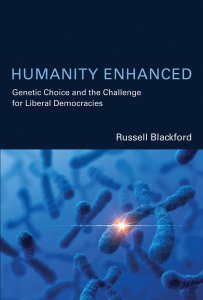 Continuing the tackling of difficult issues is his Humanity Enhanced: Genetic Choice and the Challenge for Liberal Democracies (Basic Bioethics)
Continuing the tackling of difficult issues is his Humanity Enhanced: Genetic Choice and the Challenge for Liberal Democracies (Basic Bioethics):
Emerging biotechnologies that manipulate human genetic material have drawn a chorus of objections from politicians, pundits, and scholars. In Humanity Enhanced, Russell Blackford eschews the heated rhetoric that surrounds genetic enhancement technologies to examine them in the context of liberal thought, discussing the public policy issues they raise from legal and political perspectives. Some see the possibility of genetic choice as challenging the values of liberal democracy. Blackford argues that the challenge is not, as commonly supposed, the urgent need for a strict regulatory action. Rather, the challenge is that fear of these technologies has created an atmosphere in which liberal tolerance itself is threatened. Focusing on reproductive cloning, pre-implantation genetic diagnosis of embryos, and genetic engineering, Blackford takes on objections to enhancement technologies (raised by Jürgen Habermas and others) based on such concerns as individual autonomy and distributive justice. He argues that some enhancements would be genuinely beneficial, and that it would be justified in some circumstances even to exert pressure on parents to undertake genetic modification of embryos. Blackford argues against draconian suppression of human enhancement, although he acknowledges that some specific and limited regulation may be required in the future. More generally, he argues, liberal democracies would demonstrate liberal values by tolerating and accepting the emerging technologies of genetic choice.
Another relatively recent one is 50 Great Myths About Atheism, which concisely examines some untrue beliefs about atheists and non-belief, and has been given high endorsements by the likes of Richard Dawkins and Peter Singer. I would also thoroughly recommend his book Freedom of Religion and the Secular State
, especially if you have an interest in the intersection of politics with religion and why having secular states unbeholden to a particular belief system is in the best interests of everyone.
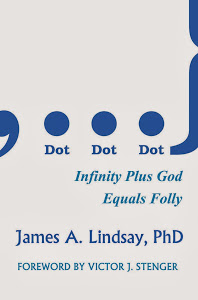 James A. Lindsay, a mathematician who also contributes to ATP, recently published a book titled Dot, Dot, Dot: Infinity Plus God Equals Folly
James A. Lindsay, a mathematician who also contributes to ATP, recently published a book titled Dot, Dot, Dot: Infinity Plus God Equals Folly:
Infinity and God have been close bedfellows over the recent millennia of human thought. But this is James A. Lindsay’s point. These two ideas are thought, mere concepts. Lindsay shows in a concise and readable manner that infinity is an abstraction, and shows that, in all likelihood, so is God, particularly if he has infinite properties.
This book is about math. It is about God. It is about stressing the importance of not confusing these two ideas with reality. Never the twain shall meet.
“A short and engaging read on the meeting of two huge ideas, infinity and God, that leaves us seeing both as abstract ideas that may have nothing to do with reality. Honest and accessible, Dot, Dot, Dot is a great little book to stretch your thinking.” – Peter Boghossian, author of A Manual for Creating Atheists
 And, if you’re just too broke to buy anything but still have access to a printer and ink, you could always just make and hand out these amazing Carl Sagan / Skeptic Ink papercrafts!
And, if you’re just too broke to buy anything but still have access to a printer and ink, you could always just make and hand out these amazing Carl Sagan / Skeptic Ink papercrafts!

